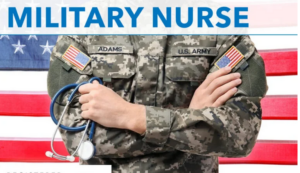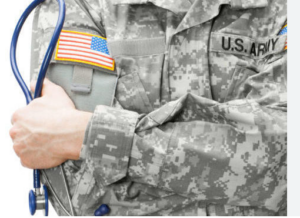Military Nurse Career Overview
 Military nurses are essential members of the U.S. Armed Forces, providing vital healthcare services to service members, veterans, and their families.
Military nurses are essential members of the U.S. Armed Forces, providing vital healthcare services to service members, veterans, and their families.
While the responsibilities of a military nurse mirror those of civilian nurses, the unique settings and challenges of military life make the role distinctly different.
Military nurses may be stationed at both domestic and overseas military bases, including conflict zones where they face heightened demands.
For those interested in pursuing military nursing careers, this guide offers key information on the path to becoming a military nurse, the training requirements, salary expectations, specialized roles, and job outlook for 2024.
What Does a Military Nurse Do?
Military nurses are responsible for delivering essential healthcare services, whether in military healthcare facilities or on the front lines of conflict. Their duties range from administering patient care, conducting surgeries, and overseeing recovery, to coordinating care with other military medical personnel. Military nursing specialties include critical care, flight nursing, trauma care, and more. In addition to providing general nursing care, military nurses are also responsible for handling complex cases, often in austere environments where medical resources can be limited.

Struggling to meet your deadline?
Get your assignment on Military Nurse Career Overview done by certified MDs and PhDs in the USA. ORDER NOW!
In terms of education, military nurses must meet military nurse training requirements that include specialized military education and certifications. As an example, nursing exams are a common requirement for aspiring nurses in the military to demonstrate proficiency in the field. They must also stay up to date on nursing research and innovations to apply cutting-edge practices in their care.
How to Join the Army Nurse Corps: Requirements and Steps
Becoming a military nurse begins with meeting the necessary educational and professional qualifications. Here’s an overview of how to join the Army Nurse Corps, Navy Nurse Corps, or Air Force:
- Obtain a Nursing Degree: The first step in becoming a military nurse is earning a Bachelor of Science in Nursing (BSN), which is typically required by most military branches. For certain positions, military nurses with an Associate Degree in Nursing (ADN) or a nursing diploma may be accepted, though having a BSN opens more opportunities, especially for specialized roles.
- Pass the NCLEX-RN: To become licensed as a registered nurse (RN), candidates must pass the National Council Licensure Examination (NCLEX-RN). Many nurses also prepare for these exams by completing nursing assignments or engaging in nursing research to enhance their understanding and preparedness for the NCLEX.
- Complete Officer Basic Leadership Course (BOLC): Upon joining the military, nurses will go through BOLC training. This program teaches military protocols, leadership, and combat survival, which are all integral to their role in the armed forces.
- Specialized Training: Depending on their chosen specialty (e.g., flight nurse or nurse anesthetist), military nurses will undergo additional training and certifications in their field.
Benefits and Challenges of Being a Military Nurse
Becoming a military nurse offers a wide range of benefits but also comes with challenges. Here are some of the key advantages and disadvantages:
Advantages:
- Job Security and Stability: Military nurses benefit from steady employment and a strong job outlook, with the military nurse job outlook showing consistent demand for nursing professionals in the armed forces.
- Training and Education: Military nurses receive military nurse training that includes specialized education, leadership development, and unique hands-on experiences that are difficult to replicate in civilian healthcare settings. Many military nurses also take advantage of educational benefits, pursuing advanced degrees while on duty.
- Generous Benefits: Military nurses receive numerous benefits, including competitive salaries, housing allowances, healthcare, and access to specialized programs like student loan repayment. Nurses may also access online nursing essays and resources for continued professional development or advanced certifications.
Disadvantages:
- Potentially Hazardous Environments: Serving in combat zones exposes military nurses to high-risk situations. Nurses deployed to these areas must adapt to working in challenging conditions, with limited medical resources and high-pressure environments.
- Frequent Relocation: Military nurses may be reassigned to different locations, both in the U.S. and abroad. This can be difficult for those with families or personal commitments.
- Longer Commitment: Military nurses often sign up for extended contracts that bind them to military service for several years. This is a lifestyle commitment, not just a job.
Specialized Military Nurse Roles and Duties
There are various specialized roles within the military nurse careers, each with its own unique set of duties, responsibilities, and required training. These roles may involve further certifications and advanced education:
- Flight Nurse: Flight nurses provide emergency and critical care during the transport of injured or ill patients, often under challenging conditions. They may work in military aircraft during combat zones or humanitarian missions.
- Nurse Anesthetist Military Career: Nurse anesthetists provide anesthesia care in surgeries and procedures. In the military, this role can be particularly demanding, as they may work in combat hospitals or trauma centers.
- Critical Care Nurse: Military nurses with expertise in critical care may work in trauma centers or intensive care units (ICUs), providing life-saving care to soldiers wounded in action or dealing with severe medical conditions.
- Military Nurse Practitioner: Some military nurses pursue additional education to become nurse practitioners (NPs) and provide primary or specialized care, such as pediatrics, women’s health, or internal medicine.
Each of these specialized roles requires unique military nurse certifications in addition to the basic nursing qualifications. For example, nursing research and understanding the latest advancements in anesthesia or flight nursing are essential for these positions.
 Military Nurse Salary vs. Civilian Nurse Salary
Military Nurse Salary vs. Civilian Nurse Salary
Salaries for military nurses differ from those in civilian healthcare settings. While civilian nurses earn a median salary of approximately $75,330 (according to the U.S. Bureau of Labor Statistics), military nurses earn salaries based on their rank, experience, and additional responsibilities. Entry-level military nurses may earn a lower salary than their civilian counterparts but gain other benefits such as housing allowances, healthcare, and student loan repayment.
For example, a newly commissioned Army nurse salary typically starts lower than the civilian median but increases with rank and experience. Special incentives may also apply for nurses who specialize in military nursing specialties like anesthesia or flight nursing.
Military Nurse Job Outlook: Career Prospects for 2024
The military nurse job outlook is favorable, with consistent demand for trained and experienced nursing professionals. With a projected growth rate of 7% for Registered Nurses (RNs) through 2029 (as noted by the Bureau of Labor Statistics), the demand for nurses in the military healthcare system remains strong, particularly for those willing to take on more specialized roles such as flight nurse or nurse anesthetist military career.
While salaries for military nurses may be lower at the outset compared to civilian counterparts, the benefits—such as access to nursing assignments abroad, nursing exams preparation, and custom nursing papers for continued professional development—make it an attractive long-term career option.
Steps to Become a Military Nurse
To pursue a career as a military nurse, the following steps must be completed:
- Obtain a BSN or Graduate Nursing Degree: As the foundation for most military nursing jobs, earning a BSN is the first step. Some may choose to earn higher-level degrees, which can help with career advancement.
- Pass the NCLEX: All prospective nurses must pass the NCLEX exam to receive licensure.
- Join a Military Branch: Applicants will then select a branch—Army, Navy, or Air Force—and enlist. Each branch has specific requirements and offers unique roles for nurses.
- Complete Officer Training: Military nurses participate in BOLC or a similar officer training program to prepare them for military life.
- Specialization and Ongoing Education: Many nurses go on to pursue nursing certifications in specialties like anesthesia, flight nursing, or critical care, enhancing their earning potential and professional development.
Military Nurse Training Programs: Education and Certification
Military nurses undergo extensive training programs that include both military nurse training and advanced nursing certifications. These certifications ensure that military nurses can deliver high-quality care in diverse environments. Nurses may also engage in nursing assignments and nursing research to further refine their skills and expand their knowledge base.
Some important certifications military nurses may pursue include:
- Basic Life Support (BLS)
- Advanced Cardiac Life Support (ACLS)
- Pediatric Advanced Life Support (PALS)
Furthermore, military nurses may rely on online nursing papers and nursing essays to stay current with the latest research, medical practices, and healthcare innovations.
Certification Options for Military Nurses:
In addition to holding a nursing license, military nurses must possess additional life support certifications tailored for emergencies among specific populations. While all military nurses need Basic Life Support (BLS) certification, some specialties may necessitate Advanced Cardiac Life Support (ACLS) and Pediatric Advanced Life Support (PALS) certifications.
Basic Life Support (BLS) Certification:
This American Heart Association course equips first responders with the skills to use chest compressions, proper ventilation, and defibrillators in life-threatening emergencies for adults, children, and infants.
Advanced Cardiac Life Support (ACLS) Certification:
Building on BLS skills, this course trains healthcare professionals to recognize and manage respiratory and cardiac arrest, delivering effective cardiopulmonary resuscitation (CPR) during emergencies.
Pediatric Advanced Life Support (PALS) Certification:
Designed for professionals in emergency medicine, critical care, intensive care, and emergency medical services, PALS training instructs healthcare professionals on responding to emergencies involving children and infants.
How Much Do Military Nurses Make?
All military nurses are RNs. While the U.S. Bureau of Labor Statistics notes that civilian nurses earn a median salary of $75,330, military pay structures exhibit considerable variation. Military nurse salaries are linked to individual rank, enlistment status, and certifications. Typically, new military nurses earn less than their civilian counterparts.
Military nurses enjoy various benefits beyond their salary, including paid time off, sign-on bonuses, student loan repayment options, and eligibility for tuition assistance, allowing them to pursue advanced degrees at a discounted rate.
In general, there is high demand for both civilian and military nurses, with a projected steady 7% job growth rate for RNs through 2029, according to the Bureau.
Find State-Specific Salary Data Military Nurse Salary
How Does the Military Ranking System Apply to Military Nurses?
The military ranking system determines the salary potential for military nurses, establishing base pay according to experience and ranking achievements. While all nurses are officers, the specific rank and base pay depend on their prior military experience. Without military experience, nurses commence at the bottom of the rank structure, earning less each month than those with four or more years of experience as an enlisted officer. Additional pay incentives may be offered based on commission type, work setting, and commitment length.
 How Much Do Military Nurses Make?
How Much Do Military Nurses Make?
Military nurses’ salaries are generally based on their rank and years of service. A nurse without military experience may start at a lower salary than their civilian counterparts, but military nurses receive additional benefits such as healthcare, housing allowances, and access to advanced training. After several years of service, military nurses can earn salaries in the range of $60,000 to $97,000 or more, depending on their rank, experience, and role.
Frequently Asked Questions About Military Nursing Careers
How much do military nurses make?
Military nurses earn salaries based on their rank, service years, and additional benefits such as housing and healthcare allowances. Starting salaries range from $40,000 to $60,000, with the potential for higher earnings depending on rank and experience.
Do military nurses go to boot camp?
No, military nurses do not attend basic boot camp. Instead, they participate in an Officer Basic Leadership Course (BOLC) to learn military protocols and leadership skills.
What is the job outlook for military nurses?
The job outlook for military nurses is strong, with ongoing demand for healthcare professionals in both domestic and international settings.In summary, a career as a military nurse offers a combination of job stability, specialized training, and the opportunity to make a meaningful impact in both military and civilian settings. For those interested in a nursing career with a global perspective, serving as a military nurse can be an extremely rewarding option, with ample opportunities for nursing research, online nursing papers, and professional development.
Resources for Military Nurses:
U.S. Army:
This site provides information about various Army nursing roles and benefits. Visitors can read stories from individuals who have pursued diverse paths to serve in the Army. Interested nurses can also contact a recruiter through the site.
Navy Reserve Careers:
This site offers insights into joining the Navy on a part-time basis, including roles and responsibilities of Navy Reserve Sailors, qualifications for Navy Reserve Nurses, career benefits, and the enlistment process.
Air Force Nursing:
A resource for potential Air Force nurses, offering career information and exploring the benefits of joining. Learn specifics about training and education, life in the military, and connect with a recruiter for more information.
Navy Nurse Corps:
Comprising full-time, active-duty enlisted service members, the Navy Nurse Corps provides information on the site. Connect with a recruiter, check qualifications, and learn more about the role, responsibilities, training process, and education options.
Army Nurse Corps Association:
ANCA is a professional organization for current and former Army Nurse Corps members. The association sponsors scholarships, contributes to research, supports professional development, and provides networking opportunities. Eligible nurses can join online, accessing a wealth of resources, including job listings.

Dont wait until the last minute.
Provide your requirements and let our native nursing writers deliver your assignments ASAP.

